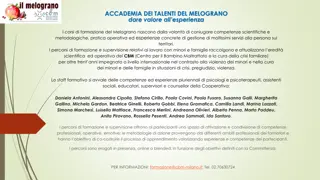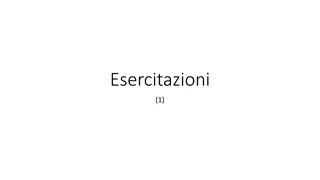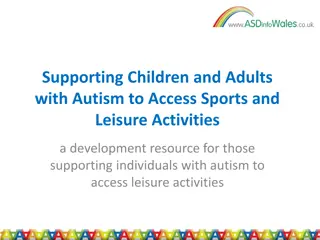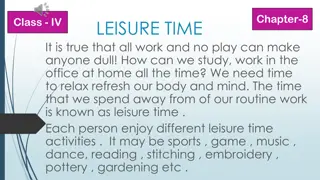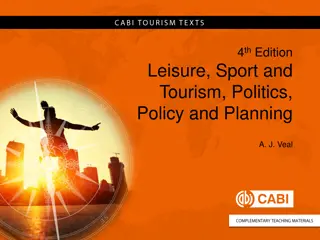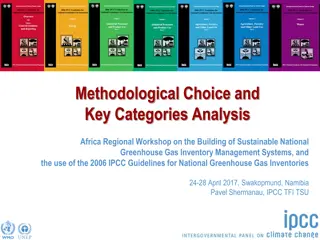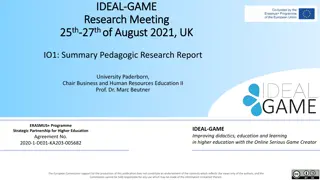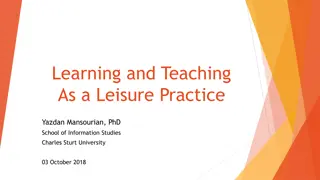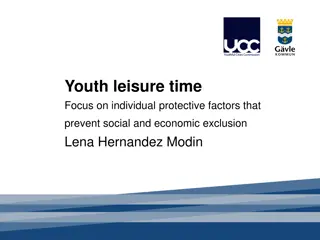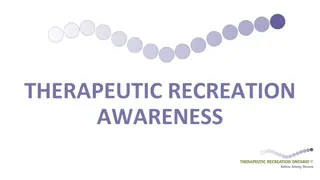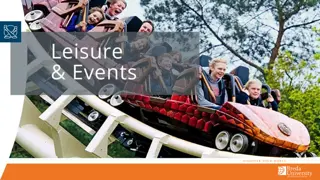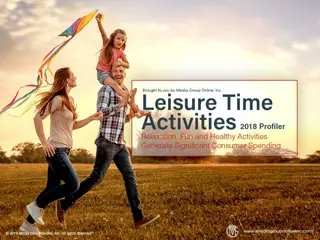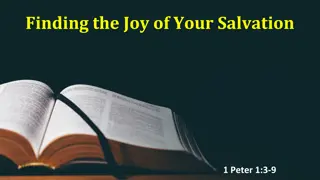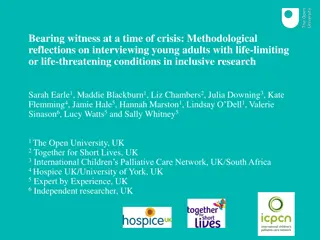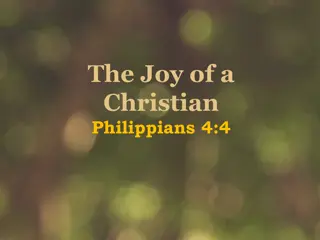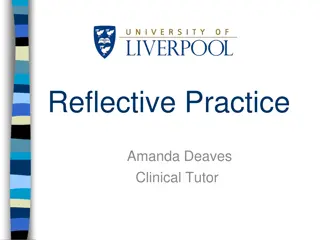Capturing the Joy of Information in Serious Leisure Research: A Methodological Reflection
This presentation by Dr. Yazdan Mansourian delves into the concept of serious leisure and the Joy of Information within this niche. It explores the applicability of qualitative methods in understanding human information behavior in the context of hobbies, amateurism, and volunteer activities.
Download Presentation

Please find below an Image/Link to download the presentation.
The content on the website is provided AS IS for your information and personal use only. It may not be sold, licensed, or shared on other websites without obtaining consent from the author. Download presentation by click this link. If you encounter any issues during the download, it is possible that the publisher has removed the file from their server.
E N D
Presentation Transcript
Capturing the joy of information in serious leisure research: A methodological reflection on the applicability of qualitative methods Yazdan Mansourian, PhD, AALIA School of Information Studies ymansourian@csu.edu.au
Introduction This presentation provides an overall picture of my research program on human information behaviour in the context of serious leisure (hobbies, amateurism and volunteer activities). It also introduces the Joy of Information as an emergent concept in this research niche. The paper presents a methodological reflection on the applicability of qualitative methods in this area. 2
What is serious leisure? Serious leisure is a term originally coined by Robert Stebbins in 1982 and includes a wide range of hobbies, amateurism and volunteer activities which are inspiring, sufficiently substantial and adequately challenging for the participants. (Stebbins, 1982) 3
Six criteria of serious leisure: Perseverance and commitment, Potentiality to turn into a career, Significant personal effort, Durable personal and social benefits, Unique ethos within a social world Personal and social identity (Stebbins, 1982)
Various kinds of serious leisure Collecting (e.g. art collecting, coin collecting) Making (e.g. knitting, wood carving) Tinkering (e.g. car restoration, repairing) Performing (e.g. swimming, dancing, bowling) Competitive hobbies (e.g. badminton, cricket) Outdoor hobbies (e.g. horse riding, fishing) Observing (e.g. bird watching, photography) Learning (e.g. liberal arts, genealogy) 5
Main groups and categories of serious leisure Examples of serious leisure activities Source preference & dominant information behaviour Historical research Genealogy and family history Liberal arts Book clubs Study foreign languages Advocacy/activism Lifelong learning Poetry Explicit knowledge, text, images and other physical resources. Storage and retrieval techniques People to people sources Intrinsic pleasure in looking and finding meaningful information Heavy time commitment to information searching and retrieval Data creation, organizing and dissemination Events and seminars to source and disseminate information. Appreciators Intellectual pursuits emphasis on intellectual/knowledge development Collecting (e.g. antiquing, art collecting) Bonsai growing Bird or animal husbandry Advanced craft activities e.g. knitting, woodworking Rail transport modelling Rubber duck collection Glassblowing Vintage clothing Combination of explicit and tacit knowledges used Sharing of expertise (person to person or in groups) Observation and mentoring The body as an information source Objects as information sources Events as information sources and products e.g. exhibitions, festivals Social world building through shared information experiences Producers/Collectors Creating or collecting physical objects/materials/ products - emphasis is on skills development Surfboard riding Rock climbing White water canoeists Marathon runners Triathlon Skydiving Flying aeroplanes Golf, cricket, billiard, etc. Backpacking Artistic performance such as dance, theatre and music. Tacit knowledge predominates The expert is more collegial but mentors might play an important part The body as an information source Environmental information e.g. wind, rain, sun Events e.g. triathlon, surf classics, performances, exhibitions, festivals. Social construction i.e. social world building through experience sharing. Performers Experiential activities emphasis is on performing and the use of the body as a source of information 6 Mansourian, Y. (2020). How passionate people seek and share various forms of information in their serious leisure. The Journal of the Australian Library and Information Association (JALIA), 69(1), 17-30.
Personal and social benefits of serious leisure Positive psychological wellbeing through personal enrichment, self-actualization, self- expression, and enhancing self-image. Stress reduction, enjoyable distraction, social support, self-determination, and optimism. Social connections, adjusting emotional turbulence, reducing cultural distance, group accomplishment celebrated in festivals. Alleviate boredom, build a life style around a core activity and experiencing flow.
Information Behaviour in SL Human Information Behaviour Everyday Life Information Seeking Non-work Information Behaviour Serious Leisure Information Behaviour 8
My Current Research Map Wellbeing Research Ageing Studies Information Research Leisure Studies Serious Leisure Perspective (SLP) 9
Research question The primary research question is to what extent serious leisure participants experience the joy of information and how qualitative methods enable researchers to capture, conceptualise and contextualise it. 10
Research Design This research adopted the Serious Leisure Perspective as its theoretical framework and employed a naturalistic and interpretive approach using qualitative methods. Twenty volunteers from Wagga Wagga city in Australia participated in the first project. They have been recruited based on the maximum variation sampling technique to represent a wide range of activities. A semi-structured interview with open-ended questions was used. The collected data was fully transcribed and analysed through a qualitative thematic analysis method. (Mansourian, 2021) 11
A methodological reflection Qualitative methods are highly applicable to capture the joy of information in real contexts. Across the spectrum of qualitative methods, phenomenological and hermeneutic perspectives (van Manen, 2016) are more appropriate and fruitful for this purpose. Nonetheless, other methodologies such as Grounded Theory and Thematic Analysis are very useful. 12
References Fulton, C. (2009). The pleasure principle: The power of positive affect in information seeking. Aslib Proceedings, 61(3), 245 261. Fulton, C. (2016). The genealogists information world: Creating information in the pursuit of a hobby . Journal of Multidisciplinary Research, 8(1), 85 100. Hartel, J. (2014). An interdisciplinary platform for information behaviour research in the liberal arts hobby. Journal of Documentation, 70(5), 945-962. Heo, J., Stebbins, R. A., Kim, J., & Lee, I. (2013). Serious leisure, life satisfaction, and health of older adults. Leisure Sciences, 35, 16 32. Lee, C., & Payne, L.L. (2016). Experiencing flow in different types of serious leisure in later life. World Leisure Journal, 58(3), 163-178.
References Mansourian, Y. (2020). How passionate people seek and share various forms of information in their serious leisure. Journal of the Australian Library and Information Association, 69 (1), 17-30. Mansourian, Y. (2020). What is transcendental information? A conceptual paper. Libres: Library and Information Science Research Electronic Journal, 30(1), 33-44. https://www.libres-ejournal.info/3164/ Mansourian, Y. (2021). Information activities in serious leisure as a catalyst for self-actualisation and social engagement. Journal of Documentation, https://doi.org/10.1108/JD-08-2020-0134 Stebbins, R. A. (1982). Serious leisure: A conceptual statement. Pacific Sociological Review, 25, 251-272. Van Manen, M. (2016). Phenomenology of practice: Meaning-giving methods in phenomenological research and writing. Routledge Taylor & Francis Group.
Thank you for your attention! Any questions or comments? Photo by Yazdan Mansourian

 undefined
undefined





